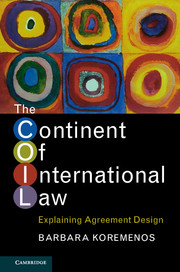Book contents
- Frontmatter
- Dedication
- Contents
- List of figures
- List of tables
- Acknowledgments
- 1 (Re)discovering the continent
- Part I COIL's building blocks: theory and data
- Part II Flexibility provisions in the design of international law
- Part III Centralization, scope, and control provisions in the design of international law
- Appendix 1 List of agreements in COIL sample
- Appendix 2 Coding rules
- Appendix 3 Selection issues in international cooperation data sets
- References
- Index
Part I - COIL's building blocks: theory and data
Published online by Cambridge University Press: 05 June 2016
- Frontmatter
- Dedication
- Contents
- List of figures
- List of tables
- Acknowledgments
- 1 (Re)discovering the continent
- Part I COIL's building blocks: theory and data
- Part II Flexibility provisions in the design of international law
- Part III Centralization, scope, and control provisions in the design of international law
- Appendix 1 List of agreements in COIL sample
- Appendix 2 Coding rules
- Appendix 3 Selection issues in international cooperation data sets
- References
- Index
Summary
Introduction to Part I
Part I introduces the theoretical framework and empirical component of the COIL research project. Part I thereby sets the stage for the analyses of flexibility, centralization, scope, and control provisions that follow in Parts II and III.
Chapter 2 briefly positions COIL among other scholarly work by elaborating its main assumptions. COIL's basic theoretical premise is that international agreement design and comparison across agreements begin by understanding the underlying cooperation problem(s) that the agreements are trying to solve. COIL identifies eight distinct and recurrent cooperation problems that states potentially face alone or in various combinations, depending on the particular characteristics of the underlying environment in which cooperation occurs. I thus give considerable attention to the concept of underlying cooperation problems, given its centrality in the COIL research program. I also identify some characteristics of state actors in the aggregate that have implications for agreement design. I then briefly present the four broad dependent variables analyzed in the rest of the book: Flexibility, Centralization, Scope, and Control.
A set of theoretical conjectures linking the independent variables (cooperation problems; state characteristics) to broad dimensions of institutional design are presented and discussed. Distinct cooperation problems call for nuanced agreement design solutions. In this way, institutions (i.e., pieces of international law with specific design features) are explicitly incorporated as options in the game – equilibrium institutions. This chapter concludes first by examining the implications of considering international law as an equilibrium institution, and second by briefly highlighting COIL's theoretical connections to other subfields of political science.
The empirical contribution of the COIL research program, which features a random sample of agreements across the issue areas of economics, environment, human rights, and security, is presented in Chapter 3. I first describe the data collection effort, including its empirical foundations and the main COIL attributes, many of which get beyond common selection problems in other data collection efforts, like those that select on agreements with particular members or on multilateral agreements. I place COIL on the spectrum of other data sets featuring international agreements, highlighting differences and complementarities. I elaborate the background research that went into coding the underlying cooperation problems of a particularly puzzling agreement in the COIL sample: The Agreement for Environmental Cooperation between Denmark and Oman signed in 1993.
- Type
- Chapter
- Information
- The Continent of International LawExplaining Agreement Design, pp. 23 - 24Publisher: Cambridge University PressPrint publication year: 2016



